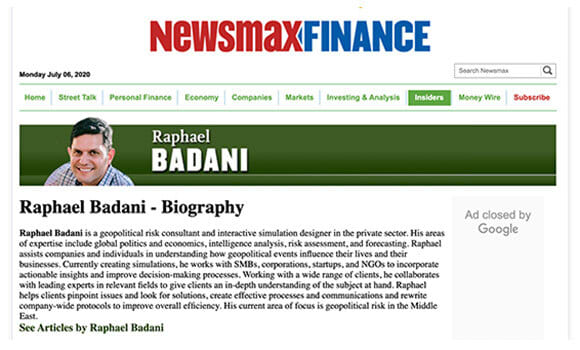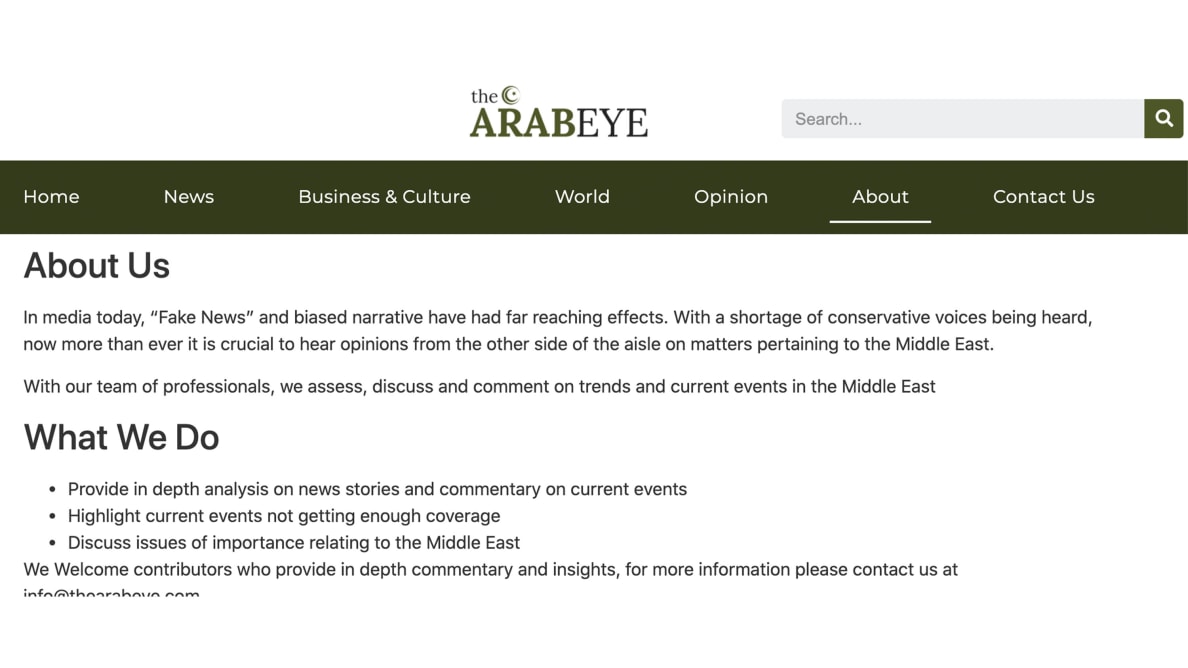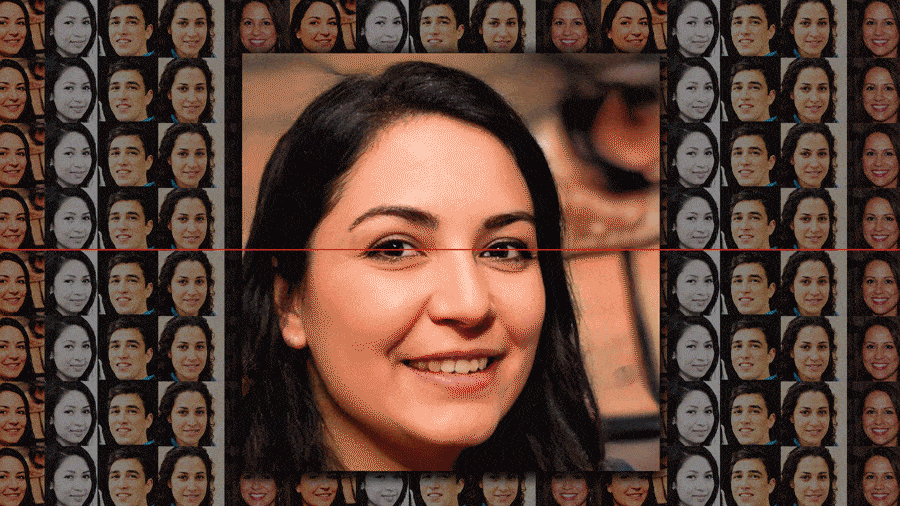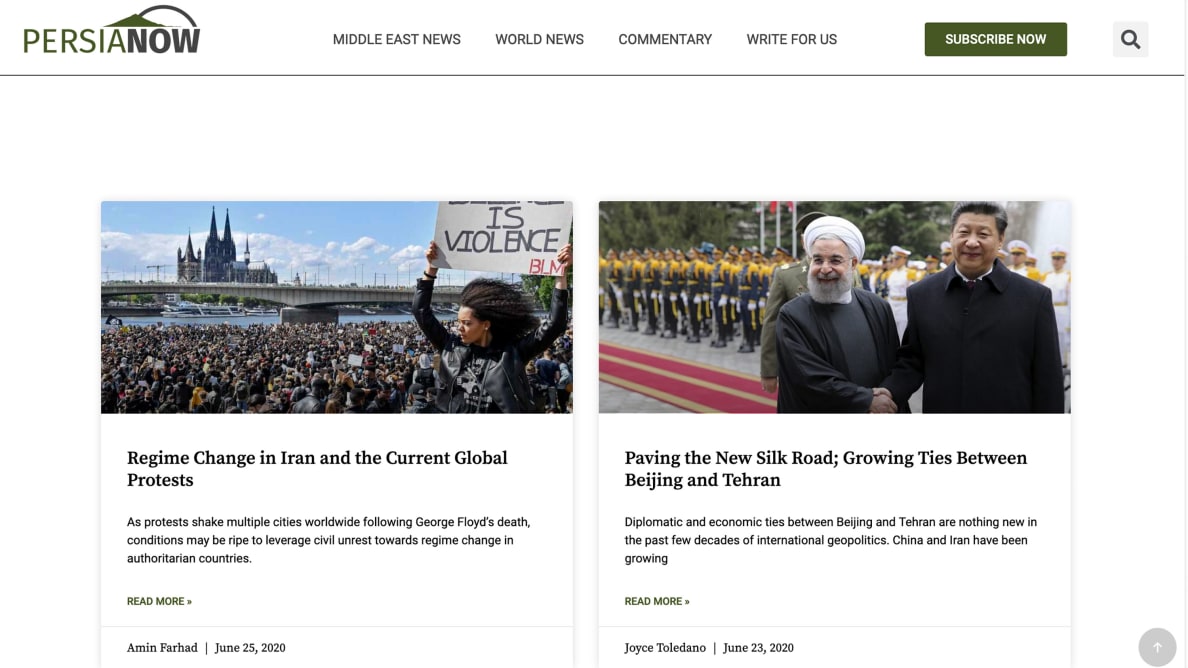Right-Wing Media Outlets Duped by a Middle East Propaganda Campaign

Photo Illustration by The Daily Beast/Getty
Conservative sites like Newsmax and Washington Examiner have published Middle East hot takes from “experts” who are actually fake personas pushing propaganda.
If you want a hot take about the Middle East, Raphael Badani is your man.
As a Newsmax “Insider” columnist, he has thoughts about how Iraq needs to rid itself of Iranian influence to attract investment and why Dubai is an oasis of stability in a turbulent region. His career as a “geopolitical risk consultant and interactive simulation designer” and an “international relations senior analyst” for the Department of Labor have given him plenty of insights about the Middle East. He’s printed those insights at a range of conservative outlets like the Washington Examiner, RealClear Markets, American Thinker, and The National Interest.
Unfortunately for the outlets who published his articles and the readers who believed them, Raphael Badani does not exist.
His profile photos are stolen from the blog of an unwitting San Diego startup founder. His LinkedIn profile, which described him as a graduate of George Washington and Georgetown, is equally fictitious (and was deleted following publication of this article).

Badani is part of a network of at least 19 fake personas that has spent the past year placing more than 90 opinion pieces in 46 different publications. The articles heaped praise on the United Arab Emirates and advocated for a tougher approach to Qatar, Turkey, Iran and its proxy groups in Iraq and Lebanon.
Following this article’s publication, the Washington Examiner deleted its article written by “Badani,” replacing it with an editor’s note: “This op-ed has been removed after an investigation into its provenance and authorship.” Spiked, a British libertarian site, added a note atop both its articles by a fake persona, saying the outlet “takes seriously any claim of questionable authorship,” but left the text up in the interest of “transparency.”
Human Events, meanwhile, also affixed an editor’s note atop their article written by a fake persona, but outright defended its publication, writing: “We have reviewed the substance of this piece, and have not found any factual errors—and we still agree with the thesis of the piece. As such, we are keeping the piece up, and adopting its arguments as a publication.”
Newsmax deleted all articles by “Badani” and scrubbed his profile page listing him as an “insider”—all without any editor’s notes. The Post Millennial, The Jerusalem Post, and The National Interest also deleted their articles without any statement. (Yahoo News, which shared the National Interest’s story as part of a content share, said on Tuesday that they’ve deleted their iteration of the article and “are investigating and will take the necessary action with our partner to prevent this from happening in the future.”)
On Monday, Twitter suspended Badani’s account along with 15 others after The Daily Beast shared the results of its investigation into the network for violating the company’s “policies on platform manipulation and spam.”
“Using technology, human review, and partnerships with researchers and other independent organizations studying these issues, we work to identify platform manipulation on our service and take action,” a Twitter spokesperson told The Daily Beast in a statement. “As is standard, if we have reasonable evidence to attribute any activity to a state-backed information operation, we’ll disclose them—following thorough investigation—to our public archive.”
“This vast influence operation highlights the ease with which malicious actors can exploit the identity of real people, dupe international news outlets, and have propaganda of unknown provenance legitimized through reputable media,” Marc Owen Jones, an assistant professor at Hamad Bin Khalifa University in Qatar who first noticed suspicious posts by members of the network, told The Daily Beast. “It’s not just fake news we need to be wary of, but fake journalists.”
The network’s spree of hot takes targeted a range of publications and placed articles critical of Qatar and supportive of tougher sanctions on Iran in conservative North American outlets like Human Events and The Post Millennial, founded by conservative writer Andy Ngo, as well as Israeli and Middle Eastern newspapers like The Jerusalem Post and Al Arabiya, and Asian newspapers like the South China Morning Post.
Tying the network together is a series of shared behavioral patterns. The personas identified by The Daily Beast were generally contributors to two linked sites, The Arab Eye and Persia Now (which, following this article’s publication, have both been entirely deleted); had Twitter accounts created in March or April 2020; presented themselves as political consultants and freelance journalists mostly based in European capitals; lied about their academic or professional credentials in phony LinkedIn accounts; used fake or stolen avatars manipulated to defeat reverse image searches; and linked to or amplified each others’ work.
The earliest posts from personas in the network date back to July 2019 and were authored by Lin Nguyen, a fake “analyst in South Asian regional security,” according to her author biography. Nguyen and another persona, Cindy Xi, wrote mostly on East Asian issues, particularly how Hong Kong’s economy was faring under the coronavirus pandemic.
But the network soon grew and expanded its focus towards the Middle East. In February, two websites, The Arab Eye and Persia Now, were registered on the same day and began to acquire a host of contributors.
The Arab Eye describes itself, ironically enough, as a bulwark against “‘Fake News’ and biased narrative” with a mission that “now more than ever it is crucial to hear opinions from the other side of the aisle on matters pertaining to the Middle East.”
The sites may not appear to be linked to the outside observer but a search of the RiskIQ database shows both sites share the same Google Analytics account, are hosted at the same IP address, and are linked through a series of shared encryption certificates.
Like the majority of their contributors, the sites themselves appear to be fake.

Fair Use
Persia Now lists a non-existent London mailing address and an unanswered phone number on its contact form. The apparent editors of the outlets, Sharif O’Neill and Taimur Hall, have virtually no online footprints or records in journalism.
At Persia Now, The Arab Eye, and across dozens of other publications, the fake contributors have adopted similar themes in their opinion pieces. They’re critical of Qatar and, in particular, its state-funded news outlet Al Jazeera. They’re no big fans of Turkey’s role backing one of the factions in Libya’s civil war and have called it “bad news,” aimed at “constricting the flow of vital energy resources” to Europe, and “driving a wedge between and “dividing NATO.”
There are constant editorial lines like arguing for more sanctions on Iran or using international leverage to weaken Iran’s proxy groups in Lebanon and Iraq. The personas are also big fans of the United Arab Emirates and have heaped praise on the Gulf nation for its “exemplary resilience” to the COVID-19 pandemic, its “strong diplomatic ties” to the European Union, and supposedly supporting gender equality through the Expo 2020 in Dubai.
More recently, the personas have taken up the cause of criticizing Facebook for its decision to appoint Tawakkol Karman, a 2011 Nobel Peace Prize laureate, to its oversight board. Media outlets in Saudi Arabia, Egypt, and the United Arab Emirates have criticized the appointment of Karman, a former member of the Muslim Brotherhood affiliated Islah Party in Yemen, for her association with the group.
In pieces for the Jewish News Syndicate (which has since been deleted without explanation), Asia Times, Politcalite, and Middle East Online, the network cast Karman as a “nefarious political actor with a questionable past” who will make Facebook the “platform of choice for extreme Islamist ideology.”
None of the Twitter accounts associated with the network ever passed more than a few dozen followers, but a few still managed to garner high profile endorsements for their work. An article by “Joyce Toledano” in Human Events about how Qatar is “destabilizing the Middle East” got a shout-out from Students for Trump co-founder Ryan Fournier’s nearly million-follower Twitter account. French senator Nathalie Goulet high-fived Lin Nguyen’s broadside about Facebook and Tawakkol Karman (when informed of The Daily Beast’s reporting, the lawmaker replied: “Easy to tell after but thanks I will be careful.”
Bullshit Backstories
The personas in the network used a mixture of stolen or AI-generated avatars and fake biographies to make them seem more plausible.
The “Raphael Badani” Twitter account used Barry Dadon, a real San Diego businessman and startup founder, as a source for its profile photos. Without his knowledge or consent, the account owner took a photo from Dadon’s blog for a Twitter profile photo and stole a picture from the Facebook page of Dadon’s wife for the Badani Newsmax columnist page.
“Mikael Virtanen,” a fake Finnish businessman who wrote about the Middle East for the Jewish News Service, stole his avatar from a free image database. Other avatars were stolen from a Vietnam analyst at a Singapore financial consulting firm and a California insurance agent.
All of the stolen avatars were mirror image reversed and cropped from their originals, making them difficult to find through common Google reverse image searches.

Illustration by The Daily Beast
The fake contributors also appear to have used AI-generated avatars for a handful of their personas. A high-resolution profile photo of the Joseph Labba persona, posted for an article at The Post Millennial, shows some of the telltale glitches commonly found in AI-generated faces. The left ear is oddly smooth without any ear lobe creases. Middlebury Institute of International Studies research associate Sam Meyer reviewed the photo of Labba using imagery analysis software and also noticed he appears to have three misfit teeth in his mouth where there should be four.
“This mouth looks either fake or has some sad dental story behind it,” said Dr. Leonard Kundel, a dentist who agreed to review the Labba avatar for The Daily Beast. “The third tooth from the center does not look real to me. If you compare it with the canine on the other side it is obvious.”
“In addition,” Kundel said, “the two front teeth do not look like they belong in this mouth. They are both narrower than they should and slightly more forward and whiter and chalkier.”
Other avatars, like those used by the Lisa Moore and Joyce Toledano personas, show uncannily symmetrical features when overlayed on top of each other, with near perfect alignment of eyes, mouths, and eyebrows.
The backstories used to buttress the network’s credibility are similarly phony. Some authors pretended to be journalists, either freelance or former full. On her LinkedIn page, “Salma Mohamed” claimed to be a former reporter for the AP based in London, though no public record of an AP journalist matching Salma Mohamed’s description is available.

Fair Use
Another persona, Amani Shahan, described herself in bios for Global Villages and Persia Now as being a contributor to and “ghostwriting articles” for The Daily Beast. No one by that name has ever written for The Daily Beast and The Daily Beast does not employ ghostwriters. (Shahan also referred to herself with both male and female pronouns in different author bios.)
Others lied about their academic credentials. In articles posted at The ASEAN Post, Malaysian Reserve, and Manila Times, Cindy Xi held herself out as a “Singapore-based research analyst for clients in the private sector” with a PhD from the National University of Singapore. In an email, NUS said it was “unable to retrieve the past records in the Dept’s database” matching Xi’s name. A search of the National Student Clearinghouse database for the Navid Barani persona’s alleged undergraduate degree from James Madison University came up similarly empty.
At times, the network’s operators displayed either a mischievous sense of irony or a complete lack of self-awareness. One of its earliest pieces, “How Qatar is using Disinformation Tactics to Attack its Rivals,” complained about the state-funded Al Jazeera’s broadcasts and lamented that ”The landscape highlights a fascinating case study of how fake news can affect regional political discourse.”
The piece is also the only public evidence that someone may have gotten wise to the network’s fakery. Editors at the International Policy Digest, where it was posted in September 2019, quickly removed the article with a note saying it was taken down “in response to criticism of the article’s sourcing” and that “We regret its publication.”
Not that it caused the network much trouble. “Lin Nguyen” placed a similarly themed piece attacking Qatar about “misinformation becoming the currency of soft power” just a few days later in the Asia Times. By November, another persona from the network, Michel Haddad, was back posting at International Policy Digest.
—Andrew Kirell contributed reporting.
